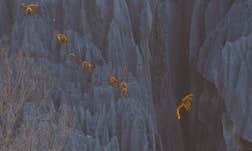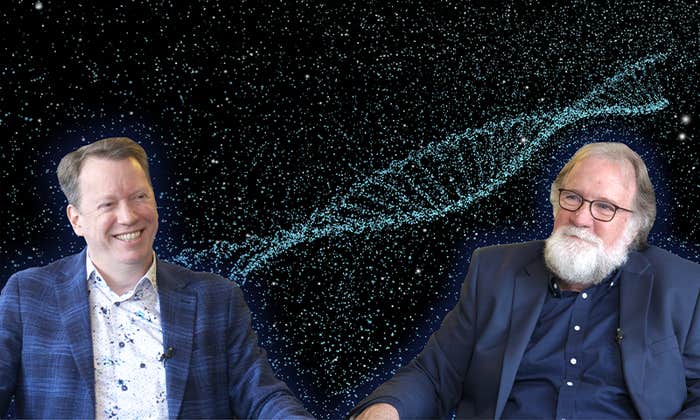The premiere issue of Nautilus, “What Makes You So Special,” is full of thought-provoking ideas, and we’re glad to see that readers were indeed provoked to talk about those ideas in our comment areas and in social media. Here are some of our favorite replies:
The most heavily commented piece so far is “Where Uniqueness Lies,” by Gary Marcus. One commenter, Gavin, added some useful context to the question of human language development:
“When you write ‘A human brain is a primate brain, tweaked,’ I think the issue, for me at least, is not so much that [it] is tweaked, but how it came to be tweaked, and an argument that is persuasive to me is that it has been language itself doing the tweaking. Thinking of language as a kind of epiphenomenon of increased intelligence or a ‘comparatively tiny cognitive enhancement’ in human brains minimizes the role of language itself in our evolutionary history. I am fairly persuaded by Terrence Deacon’s coevolutionary perspective of language and the brain and I’m curious to hear your thoughts on his perspective, or if you are not familiar with his work, how do you think the coevolution of the brain and language (in a kind of ratcheting effect over the millennia) play into your thinking on the evolution of the human mind? Thanks again for a thought-provoking post! Here’s a link to an overview of Deacon’s thinking on this.”
Another commenter, Chuch Cairns, added more on the linguistic foundation of human uniqueness:
“Several of the commentators here speculate about the evolution of human language. This is an obviously important question in this context. Readers should be aware that there is a sizable literature on this very contentious subject. I recommend Tecumseh Fitch’s The Evolution of Language, a very thorough and analytical treatment of the topic; it’s quite technical, and requires work to read it well, but anything anybody credible ever said about the evolution of language is there, including extensive discussion of Darwin’s contribution to the subject.
“Another work is Derek Bickerton’s Adam’s Tongue. It’s not a survey like Fitch’s, more of the author’s point of view, which I, for one, find quite compelling.
“My own view, as a professional linguist, is that what makes us different from other primates is not so much differences in anatomy. Brains of all organisms are computational devices of some sort. This suggests an analogy with man-made computers which, although crude, may help us frame the question. And that is, perhaps what makes our brain different from those of other apes lies in the operating system, not the architecture.”
In “The Cosmopolitan Ape,” Frans de Waal talked with Steve Paulson about how similar we are to our ape relatives, and he also chimed in in the comments.
James Killeen wrote: “Incredible article and a very interesting take on this subject. There were two points of interest in particular for me, one is a digression and the other is a comment. First, when De Waal states that bonobos don’t fight, that is incorrect and in fact the [D]iscovery [C]hannel documented one of these wars. At the end the winning side even cannibalized the losing group including females and children!”
de Waal responded: “This cannot be on bonobos. But chimpanzees do such things, not so much the cannibalizing of their enemies, but there are reliable reports of them killing neighbors. In contrast, not a single killing of one bonobo by another has ever been reported.”
In “Artificial Emotions,” Neil Savage got into the topic of machines, and when they would learn to have emotions like us. Some commenters were skeptical that our robot friends would ever grow to love or cry.
Tony Stiker wrote: “Interesting article, but missed the key point—that computers will begin to develop emotions through an evolutionary process only when we’ve successfully programmed in them a self-directed survival “instinct.” Until then it’s just mimicking, which just ain’t true emotion!”
Bruce Parker agreed: “Why do you believe we can reverse engineer the complexity of emotion, which evolution created over millions of years, resulting in a complicated array of responsible genes that we still are very far from understanding. With our present capabilities (which are not likely to change anytime soon), “artificially implanted emotions” will be nothing more than IF-THEN loops for thousands of scenarios that we would put into a robot/computer’s memory to be chosen like Big Blue made choices when it beat human chess champions.”
But other commenters saw more hope for robotic feelings:
Joans D. Gallifrey: “Why would they have to follow the same path than us ? I see your point, but I believe than artificially implanted emotions can be as real as self-developped ones. There’s no reason robots have to re-invent the emotionnal wheel when we can give it to them directly.”
Laura Harris: “There are alternatives to the overtly directed if/then approach. Emergent phenomena, while deterministic on a local level, can ‘evolve’ in surprisingly complex ways. Flocking algorithms can also provide a form of self-organization that can appear to be quite sophisticated. Flocking in a computational sense may include the gathering and assembly of a flock of emotional components—‘empels’—to create more complex and nuanced emotional displays, for instance.”
Over on the Nautilus blog, Facts So Romantic, we discussed everything from insect sex to far-away planets. Some commenters debated whether the search for ET life was worth the big financial outlay it requires.
Peter M argued that the hunt was a waste of money: “Most of the world’s sense of wonder extends only as far as their next meal. The waste of money, time and resources on this sort of futile endeavor is a scandle. Even if, and it’s a big if, we could tell if a world was inhabited we could never expect to contact them. Radio transmissions would take many years to traverse the gulf of space – assuming that we could focus enough energy on that distant planet (and allow for where it really is and will be if/when our signal arrives).
“In the meantime, people are dying here on Earth of preventable causes (it’s OK, nobody you know) which could easily be fixed if we took our eyes off the stars for a moment.
“How will we explain that to our New Friends?”
Sharan Nair disagreed: “In my humble opinion, the quest for exo-planets is a great endeavour. I disagree with the general counter-argument that earthly problems such as human disease, poverty, inequality and wars need to be removed before we engage on an endeavour of this magnitude. While these problems are significant and we must look to alleviate them, it should not stop us from exploring. Risking an over-simplistic ‘evolution’ analogy: When the first sea-creature decided to move from the sea to the land, I cannot imagine that it was because all the problems in the sea were solved and all the sea creatures were collectively ready to make the next big step to come to land. I believe that it was more a case of some sea creatures finding and taking the opportunity that others did not. Similarly I would like to think that people in developed countries such as the US today have a great opportunity (capital, global talent, prior technology and industrial base and an entrepreneurial community) that other people don’t and it would be a great human tragedy if they do not take it.”
Vince Smith also thought the hunt is laudable: “So worthwhile! The Kepler spacecraft has given us a hint of the truly vast possibilities within our galaxy. I personally think these are wondrous discoveries beyond our wildest imaginations. But they are also very threatening and frightening realizations. To think there actually may be other beings in the universe challenges our secure self-perceptions. We are in for some fundamental psychological adjustments going into the future and it won’t be easy. Just like citizens of the Known World greeting weary explorers just back from the New World. We’re trying to comprehend what’s being said but having a hard time believing. Eventually we humans will invest alot of resources into space exploration because the rewards will out weight doubts. It will be amazing watching it unfold.”
In another space-related blog post, Adam Frank suggested why our universe might be special after all, and commenters had a lively debate over whether this uniqueness leaves any space for religion. You can read their full exchange at the post, but one commenter noted that for a debate about science and religion, the whole thing was downright civil.
John Dunham wrote: “I have to admit, I read the comments sections of many articles, especially in the religious vs scientific debates; but rarely do I ever comment due to general disgust with what I see. I, however, was very impressed with both of yours (Bruce and Zaoldyeck). It is not often that I hear both sides of an argument presented in a clear non-offensive way by people who can adequately express their viewpoints without reverting to bumper sticker theology or a la cart atheism. I find the reasoning for both of your arguments valid (not necessarily true, but the internal logic holds).
“I think that with Dawkins aside, you both have hit upon on a certain key point. It centers around the possibility of the validity of belief, not necessarily the probability. The former is a foregone conclusion by anyone who has done their homework as both of you have demonstrated, the later is open for more polite discussion based upon where you lean towards. I find atheism irrational, agnosticism ration[al], and theism rational (but also revelatory). I don’t really have anything else to add, just that I enjoyed reading this conversation which is a rare thing. Cheers!
A blog post on coelecanths by Veronique Greenwood got some compliments for avoiding the tired “missing link” trope. Mindy Weisberger commented on Facebook, “Writers, take note: THIS is how you leapfrog over hackneyed and inaccurate terms like “living fossil.” Well played, Nautilus.” And overall, people seem to like the design of the site. Emily Dreyfuss tweeted that “Every site after looking at Nautil.us looks like the crumpled back page of a SaveAround coupon book.”
That surely was a bit of hyperbole, but we appreciate the sentiment.
The preview issue had some good comments as well, including a highly important tattoo rescue. In Samuel Arbesman’s story “Math as Myth,” he revealed that despite popular rumors, the Nautilus is not an example of the golden ratio. One commenter, Xavier Ashe, was particularly thankful for that factiod, commenting “You saved me from a mathematically untrue tattoo, THANK YOU!” Ashe has decided instead to go with a sunflower seed pattern, like this one.
A few visual artists chimed in on that article as well. Gary Venter, a designer, wrote:
“Proportional relationships in the visual arts are a good functional match for the Golden Mean, but the thing with dimensions is that they crave context. As an architect or graphics designer faced with actually implementing a design, you need to start with a measure—any measure. All remaining dimensional choices are derived from this; your element’s dimension is arbitrary without context.
“Le Corbusier developed his Modulor to address these issues—a co-ordinating dimensional system based on the height of a person. He used it extensively in his buildings, paintings and exhibitions. In his 1951 book on the subject, he describes how the system was used to rationalise the design and construction of his Unité d’Habitation in Marseilles. He commented: ‘I asked the drawing studio to draw up the nomenclature of all the measurements employed in the Marseilles building. Fifteen measurements had been enough. Fifteen!’
“Since then building components are mass-produced and so the baseline dimensions are pre-determined (making the Modulor and phi less useful / more difficult to implement with any level of finesse). Messy!
“For early book makers, the dimensions of the page itself were the base measure.
“I’m interested in how phi relates to web design, where the base measure has a few candidates: viewport width & height, base font size.”
Of course, all these discussions are still open, so feel free to add your thoughts while you wait for our second issue, on uncertainty, to arrive next week.
Thanks for reading—and commenting on—Nautilus.

























